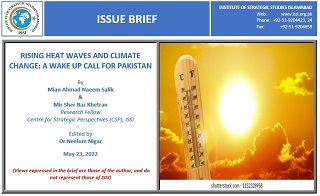Climate change has brought tremendous challenges for countries which are not limited to natural disasters alone. Rising global temperatures have wreaked havoc on international economic systems of which many rely on sound ecosystems for sustenance. Extreme heat has multiple and cascading impacts not just on human health, but also on ecosystems, agriculture, water and energy supplies and key sectors of the economy.[1] The impact on lower income countries, however, is particularly severe.
Pakistan recorded its warmest March for at least the past 60 years, with several stations breaking March records. In the pre-monsoon period, Pakistan regularly experiences excessively high temperatures, especially during May. The Intergovernmental Panel on Climate Change (IPCC), in its recent Sixth Assessment Report, also said that heatwaves and humid heat stress would be more intense and frequent in South Asia this century. More than 65 deaths have been reported in Pakistan, but the true numbers are expected to be higher. temperatures in Jacobabad and Nawabshah touched 49 Celsius at the end of April.[2]















